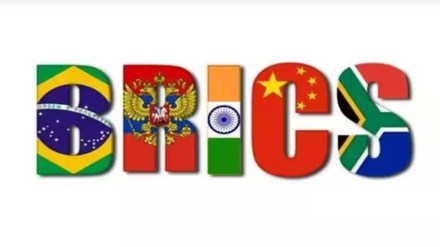Ahead of the forthcoming BRICS Summit in Johannesburg, South Africa, several countries have expressed their interest to join the grouping.
New Delhi has pursued a consistent approach towards BRICS and it has committed high financial and diplomatic resources towards consolidating the organisation.
BRICS is a part of India’s multi-alignment policy and ensures its strategic autonomy. It helps New Delhi promote its national interests in the Global South. Therefore, New Delhi should show the highest possible commitment towards this organisation.
BRICS has become the most credible organisation in the Global South. Nearly 40 emerging countries have shown interest in joining BRICS. What does this mean?
Rajan Kumar, Ph.D, Associate Professor, School of International Studies, Jawaharlal Nehru University, helps to understand certain questions related to BRICS:
“First, it shows the shift of global power in which China, India, Brazil and Russia are viewed as the leading states of the future. BRICS is no longer viewed as an ‘acronym without substance’. Rather, BRICS has become a new ‘brand’ in international politics. Second, China, India and Brazil, as economic powerhouses and Russia, as a source of arms and weapons, are viewed as potential investors. Third, BRICS does not interfere in the domestic politics of a nation. It does not pay even lip service to the idea of democracy. It stresses on ‘sovereignty’ and ‘territorial integrity’ of a state. The Global Southern states find this idea appealing in contrast to the West which slaps restrictions in the name of democracy and human rights. The states of the South are not averse to the idea of democracy as much as they are to interventions from the West. Finally, these states believe that BRICS membership will enhance their status and place them in league with the leading powers of the South,” Prof Rajan, Eurasia expert says.
However, as far as actual membership is concerned, the BRICS has yet to evolve clear principles and procedures through which new members can be admitted. Financial Express Online has reported earlier that External Affairs Minister S Jaishankar noted, “This is still a work in progress. We are approaching this with positive intent with an open mind”.
Are other members open to expansion?
No. Reports in the public domain indicate that New Delhi does not appear very keen to expand the organisation at this stage. Brazil has also expressed reservations about its expansion. “BRICS is a brand and an asset, so we have to take care of it because it means and represents a lot,” Brazilian Foreign Minister Mauro Vieira said earlier. South Africa may not articulate its concerns fearing China’s retribution. However, many experts from that country believe that the expansion may dilute the status of South Africa, especially if Nigeria or Egypt is included. South Africa will no longer remain the sole spokesperson for Africa in BRICS.
“China is pushing for the immediate expansion of BRICS. India should resist any such attempt. In collaboration with Brazil and South Africa, New Delhi should prevent the organisation from becoming a club of authoritarian states. There must be explicit norms, principles and procedures to admit new members. New Delhi must resist Beijing’s attempt to expand its influence in the organisation and use it as an instrument against the US and India,” Prof Rajan explains.
PM’s virtual or in-person meeting
According to Prof Rajan, “PM’s presence at Johannesburg will add immense value to the Summit. New Delhi has excellent ties with Pretoria.PM’s presence will be appreciated in South Africa.
Further, it has stressed the inclusion and representation of the Global South. It has advocated the membership of the African Union in the G-20. It has to show its commitment through action.”
Adding, “Virtual summits do not carry the same weight as the in-person Summit. States take pride in organising such high-profile Summits. South Africa has put much effort in hosting the Summit. Its prestige is at stake, and it would not go down well if influential leaders skipped the Summit. Moscow has its own compulsions, but the same cannot be said about other leaders. If President Xi Jinping attends the Summit in-person, and Prime Minister Modi in a virtual mode, that would send a wrong signal to South Africa.”
Meanwhile …
According to reports, France’s President, Emmanuel Macron, faced a silent rejection when he requested an invitation to the BRICS summit in South Africa. South Africa’s President, Cyril Ramaphosa, has extended invitations to 70 countries’ leaders for the summit but noticeably excluded Macron, as well as the leaders of the UK and USA.
